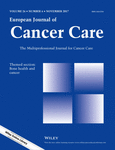A double-edged sword: Should stage IV non-small cell lung cancer patients be informed of their cancer diagnosis?
Funding information:
This study was supported by the National Key Clinical Specialist Programs of China (no. 81503622).
Abstract
This study aimed to examine whether awareness of cancer diagnosis and prognosis among patients with stage IV lung cancer treated with first-line erlotinib vary with psychological distress and quality of life (QoL). This study was carried out at the Comprehensive treatment Department of Tianjin Cancer Hospital between August 2013 and September 2015 among patients ≥18 years-old and suffering from EGFR mutation-positive stage IV non-small cell lung cancer (NSCLC) treated with first-line erlotinib (150 mg/day; N = 137). The Hospital Anxiety and Depression Scale (HADS) was administered before (baseline) and after 12 weeks of treatment. QoL was assessed using the Functional Assessment of Cancer Therapy-Lung (FACT-L) questionnaire. Diagnosis and prognosis awareness was assessed by interview. Among patients, 21% reported to be fully aware of their disease; 41% were only aware of the diagnosis, not the stage; and 51% were not aware at all. Among patients, 63.5% reported elevated anxiety, 71.5% were depressed, and 75.2% had HADS score ≥15 (emotional distress). Patients who were totally and partly aware experienced improvements in HADS and FACT-L compared with baseline (all p < .05). Patients who were not aware scored better than the other patients for all FACT-L subscales from baseline to 12 weeks (all p < .05). Aware patients experienced improvements from baseline in HADS and FACT-L (all p < .05). Awareness of cancer diagnosis and stage was associated with initially high global distress and poorer QoL. Unaware patients exhibited better emotional distress and QoL during first-line therapy with erlotinib for EGFR mutation-positive advanced NSCLC.




